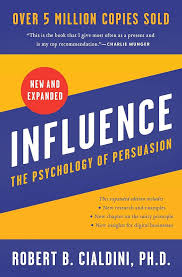This white paper explores the synergistic relationship between Robert Bolton's "People Skills" and Robert Cialdini's "Influence," demonstrating how their principles can be effectively applied to enhance marketing and sales strategies.
A White Paper: Leveraging People Skills and Influence for Marketing and Sales Success
This white paper explores the synergistic relationship between Robert Bolton's "People Skills" and Robert Cialdini's "Influence," demonstrating how their principles can be effectively applied to enhance marketing and sales strategies.
1. The Foundation: People Skills as the Bedrock of Effective Interaction
1.1 Active Listening:
- Bolton's Perspective: Emphasizes attentive listening, paraphrasing, and clarifying to understand the customer's needs and perspectives.
- Marketing/Sales Application:
- Customer Relationship Management (CRM): Implement active listening during customer interactions to gather valuable insights for personalized marketing campaigns.
- Sales Calls: Actively listen to customer concerns and objections to address them effectively and build rapport.
- Case Study: A B2B software company implemented active listening training for its sales team. This resulted in a 15% increase in customer satisfaction and a 10% improvement in sales conversion rates.
1.2 Assertiveness:
- Bolton's Perspective: Advocates for expressing oneself honestly and directly while respecting others' viewpoints.
- Marketing/Sales Application:
- Product Launches: Assertively communicate the unique value proposition of a product or service.
- Negotiations: Negotiate confidently and assertively to achieve mutually beneficial outcomes.
- Case Study: A retail chain trained its sales associates to be more assertive in recommending complementary products. This led to a 20% increase in average transaction value.
1.3 Empathy:
- Bolton's Perspective: Understanding and sharing the feelings of others.
- Marketing/Sales Application:
- Customer Service: Empathetically address customer complaints and resolve issues to foster loyalty.
- Content Marketing: Create content that resonates with the customer's emotions and addresses their pain points.
- Case Study: A telecommunications company implemented empathy training for its customer service representatives. This resulted in a significant reduction in customer churn and an improvement in customer satisfaction scores.
2. The Catalyst: Influence as the Driving Force
2.1 Reciprocation:
- Cialdini's Perspective: People feel obligated to repay favors, gifts, or concessions.
- Marketing/Sales Application:
- Free Trials/Samples: Offer free trials or samples to create a sense of obligation in potential customers.
- Loyalty Programs: Reward loyal customers with exclusive benefits and perks.
- Case Study: A coffee shop offered a free coffee to new customers who signed up for their loyalty program. This resulted in a 20% increase in program sign-ups.
2.2 Scarcity:
- Cialdini's Perspective: People value things that are rare or limited.
- Marketing/Sales Application:
- Limited-Time Offers: Create a sense of urgency with limited-time offers and exclusive deals.
- Inventory Shortages: Strategically create a perception of scarcity to increase demand.
- Case Study: An online retailer implemented a countdown timer for limited-time deals. This resulted in a 30% increase in sales during the promotion period.
2.3 Authority:
- Cialdini's Perspective: People are more likely to follow the advice of experts or authority figures.
- Marketing/Sales Application:
- Testimonials: Feature testimonials from industry experts or satisfied customers.
- Endorsements: Leverage endorsements from celebrities or influencers.
- Case Study: A health supplement company featured endorsements from medical professionals on its website. This resulted in a 15% increase in sales.
2.4 Consistency:
- Cialdini's Perspective: People are more likely to follow through on commitments they have made.
- Marketing/Sales Application:
- Free Assessments: Offer free assessments or consultations to gauge customer interest and obtain commitments.
- Social Proof: Showcase positive reviews and testimonials to encourage consistency in customer behavior.
- Case Study: A gym offered a free trial week to potential members. Those who completed the trial were more likely to sign up for a membership.
2.5 Liking:
- Cialdini's Perspective: People are more likely to say yes to those they like and trust.
- Marketing/Sales Application:
- Personalized Marketing: Tailor marketing messages to individual customer preferences.
- Building Relationships: Invest in building strong relationships with customers through personalized interactions.
- Case Study: A clothing retailer implemented a personalized email marketing campaign based on customer browsing history. This resulted in a 25% increase in click-through rates.
2.6 Consensus:
- Cialdini's Perspective: People are more likely to follow the actions of others.
- Marketing/Sales Application:
- Social Proof: Highlight positive customer reviews and testimonials.
- Bestseller Lists: Feature bestseller lists and popular products to influence customer choices.
- Case Study: A travel booking website displayed popular destinations and traveler reviews. This resulted in a 10% increase in bookings for those destinations.
3. The Integration: A Synergistic Approach
By combining the principles of "People Skills" and "Influence," marketers and salespeople can create a powerful and ethical approach to customer engagement. This involves:
- Building Rapport: Using active listening, empathy, and assertiveness to build strong relationships with customers.
- Understanding Customer Needs: Actively listening to customer needs and tailoring marketing messages accordingly.
- Leveraging Influence Principles Ethically: Applying influence principles ethically and transparently to build trust and long-term relationships.
- Measuring and Refining: Continuously measuring the effectiveness of marketing and sales campaigns and refining strategies based on customer feedback.
Conclusion
By effectively integrating the principles of "People Skills" and "Influence," marketers and salespeople can create a powerful and ethical approach to customer engagement. This synergistic approach can lead to increased customer satisfaction, improved sales conversion rates, and long-term business success.
References:
- Bolton, R. (2008). People Skills: How to Assert Yourself, Listen to Others, and Resolve Conflict. Simon & Schuster.
- Cialdini, R. B. (2007). Influence: The Psychology of Persuasion. HarperCollins.
Note: This white paper provides a general framework. Specific applications and strategies will vary depending on the industry, target audience, and specific marketing and sales objectives. Contact keencomputer.com for detail.
